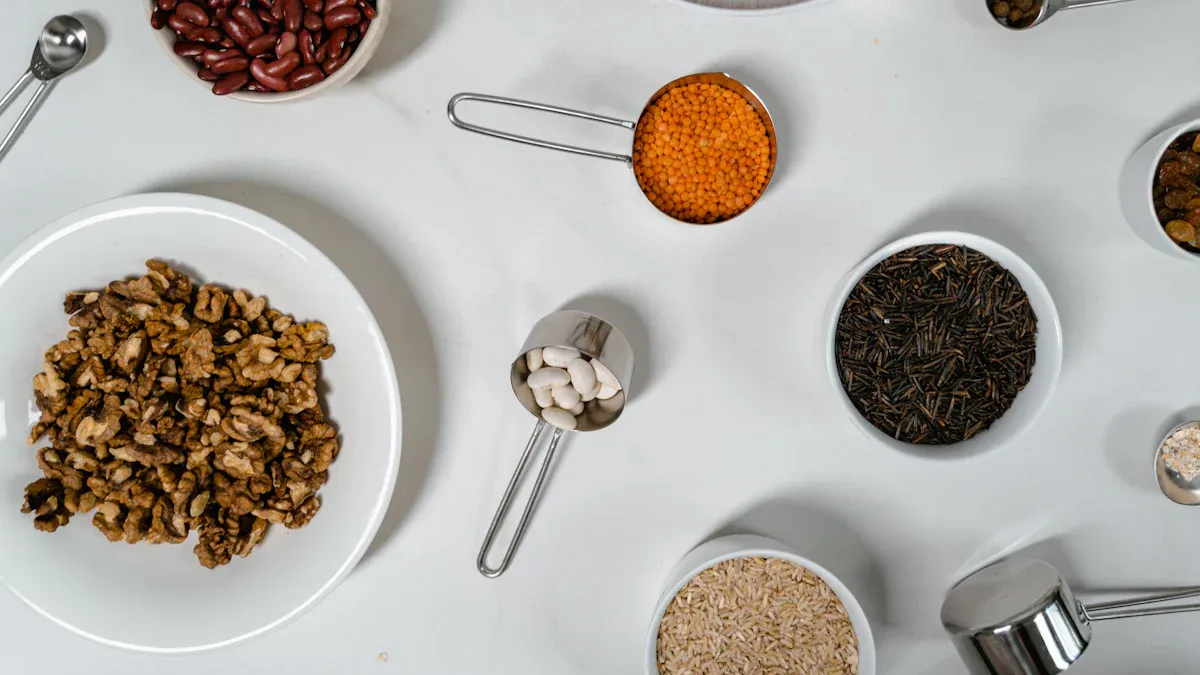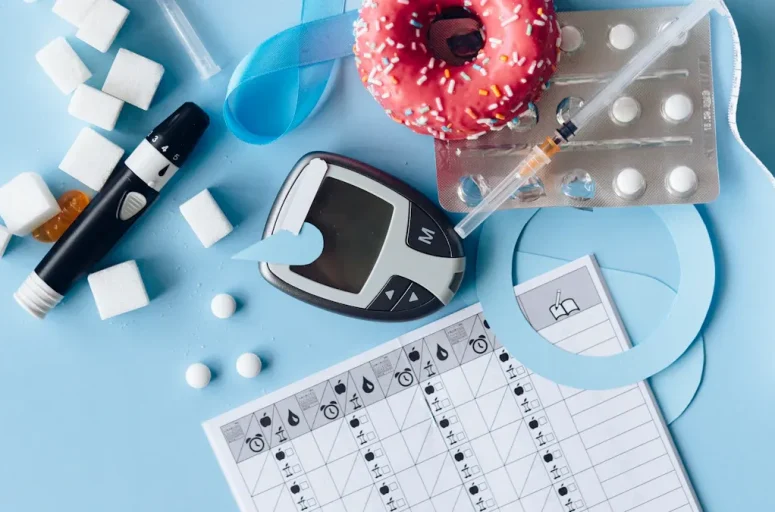
Fenugreek is a helpful plant known for its numerous fenugreek benefits, particularly in managing diabetes. Its seeds contain fiber and 4-hydroxyisoleucine, which aid in controlling blood sugar and improving insulin utilization. Studies indicate that it can lower fasting blood sugar by 1.83 mmol/L and reduce post-meal sugar levels by 3.65 mmol/L within 60 days. Additionally, fenugreek can decrease HbA1c levels by 0.85%, demonstrating its effectiveness in blood sugar control. Incorporating fenugreek into your diet is a natural way to enhance diabetes management.
Key Takeaways
Fenugreek seeds can reduce fasting blood sugar by 1.83 mmol/L. They also lower post-meal sugar by 3.65 mmol/L in 60 days.
The fibers in fenugreek slow how fast carbs are absorbed. This stops quick rises in blood sugar after eating.
A compound in fenugreek, 4-hydroxyisoleucine, helps release insulin. It also helps the body use sugar better.
Soaked fenugreek seeds are simple to make. Eating them on an empty stomach can help control blood sugar.
Fenugreek powder can be mixed into food or drinks. This helps manage blood sugar over time and lowers HbA1c levels.
Methi water, made from soaked fenugreek seeds, is easy to prepare. It offers health benefits for people with diabetes.
Sprouted fenugreek seeds have more fiber and nutrients. They help lower blood sugar and support healthy weight.
Always talk to a doctor before using fenugreek. This is important if you are pregnant or take medicines.
Nutritional profile of fenugreek
Key components for diabetes management
Fenugreek seeds have special compounds that help with type-2 diabetes. These compounds work to balance blood sugar and improve insulin use. Soluble fibers in fenugreek slow how fast your body absorbs carbs. This stops quick rises in blood sugar after eating.
Another important compound is 4-hydroxyisoleucine, an amino acid. It helps your body use sugar better and boosts insulin release. Fenugreek seeds also have saponins, which lower fasting blood sugar and HbA1c levels.
The table below shows the main parts of fenugreek seeds and their roles:
Nutritional Component | Effect on Diabetes Management |
|---|---|
Soluble fibers | Slows carb absorption and digestion |
Amino acids | Boosts insulin release and improves insulin use |
Saponins | Lowers fasting blood sugar and HbA1c |
Trigonelline | Increases insulin levels and helps store glycogen |
Diosgenin | Reduces inflammation and improves fat levels |
4-hydroxyisoleucine | Helps body tissues use sugar |
Studies back these benefits. Animal research shows fibers, trigonelline, and diosgenin lower blood sugar. A human trial proved fenugreek helps control blood sugar in type-2 diabetes.
Essential nutrients in fenugreek
Fenugreek seeds are good for diabetes and overall health. They are full of vitamins, minerals, and fiber. These seeds have iron, magnesium, and manganese, which give energy and support metabolism. They also have vitamin B6, which helps control blood sugar.
Fenugreek seeds are high in protein, which helps muscles and keeps blood sugar steady. They also have antioxidants that protect your cells from damage.
Adding fenugreek to your meals can boost your nutrition and help manage diabetes. You can eat them soaked, as methi water, or as powder to enjoy their benefits.
How fenugreek helps manage blood sugar levels
What is the glycemic index?
The glycemic index (GI) shows how food affects blood sugar. Low-GI foods release sugar slowly, keeping blood sugar steady. Fenugreek is a low-GI food, making it great for diabetes. Its fiber slows how your body digests carbs. This prevents quick rises in blood sugar after eating.
Studies show fenugreek lowers the glycemic effect of foods. In one study, people ate carb-heavy meals like rice and potatoes. Adding fenugreek flakes reduced the glycemic response by 35% for rice. For potato dishes, it dropped by 27%. This proves fenugreek helps control blood sugar when added to meals.
Fenugreek’s blood sugar-lowering effects
Fenugreek helps lower blood sugar in two ways. It boosts insulin release and helps tissues use sugar better. This lowers both fasting and after-meal blood sugar levels. Fenugreek is a natural way to manage diabetes.
Research supports these benefits. A review of 10 studies showed fenugreek lowers fasting and after-meal sugar levels. Another study found fenugreek seed powder reduced after-meal sugar in obese people. Long-term studies showed it also lowers HbA1c, a key diabetes marker.
The table below shows research findings:
Study Type | Findings |
|---|---|
Clinical Trial | |
Animal Study | Fenugreek slowed carb digestion and sugar absorption. |
Long-term Clinical Trials | Lower fasting sugar and HbA1c levels were observed. |
Meta-Analysis |
Adding fenugreek to your diet can help manage blood sugar. It’s a simple and natural way to improve diabetes care.
Best ways to consume fenugreek seeds for diabetes

Soaked fenugreek seeds
Soaking fenugreek seeds is an easy and effective method. When soaked overnight, the seeds become soft and easier to eat. This also improves their ability to control blood sugar. The fiber in soaked seeds slows sugar absorption, keeping blood sugar steady.
Research shows soaked fenugreek seeds are helpful. A study found eating whole seeds or extracts lowers after-meal sugar. Another 2015 study showed 10 grams of soaked seeds daily helped Type-2 diabetes. These results prove soaked seeds can naturally manage blood sugar.
To prepare soaked fenugreek seeds:
Take 1–2 tablespoons of fenugreek seeds.
Wash them well under running water.
Soak them in a glass of water overnight.
Eat the seeds on an empty stomach in the morning.
This simple method helps you get the most health benefits.
Fenugreek powder
Fenugreek powder is another easy way to use fenugreek. It is made by grinding dried seeds and keeps all the nutrients. You can add it to meals, smoothies, or warm water for health benefits.
Studies show fenugreek powder improves long-term blood sugar control. People who used it had lower HbA1c levels after 24 months. This means better sugar management and fewer diabetes problems. Another study found it lowers fasting and after-meal sugar, with some reaching non-diabetic levels.
To use fenugreek powder:
Mix 1 teaspoon with warm water and drink before meals.
Sprinkle it on salads or soups for flavor and health.
Add it to smoothies for a healthy drink.
This option makes it simple to include fenugreek in your diet.
Methi water
Methi water, or fenugreek seed water, is a popular choice. It is made by soaking seeds in water overnight and drinking the water. The water absorbs nutrients from the seeds, helping with diabetes.
Studies support methi water’s benefits. A 2015 study found drinking 10 grams of seeds soaked in hot water daily helps Type-2 diabetes. The fiber in methi water slows carb digestion, stopping sugar spikes.
To make methi water:
Take 1 tablespoon of fenugreek seeds.
Soak them in a glass of water overnight.
Strain the seeds and drink the water on an empty stomach.
Drinking methi water daily can improve blood sugar and overall health. It’s a simple way to use fenugreek for better well-being.
Sprouted fenugreek seeds
Sprouted fenugreek seeds are a great way to help with diabetes. Sprouting makes the seeds healthier and better for controlling blood sugar. Eating sprouted seeds gives you more fiber and nutrients that your body can use easily.
These seeds have both soluble and insoluble fiber. This fiber slows how your body absorbs carbs, stopping quick sugar spikes. Research shows sprouted fenugreek seeds lower fasting and after-meal blood sugar in type II diabetes. They also help your body use insulin better by boosting insulin release. This makes them a smart choice for managing diabetes.
Tip: You can sprout fenugreek seeds at home. Soak them overnight, drain the water, and wrap them in a damp cloth for 2–3 days. Rinse daily to keep them fresh.
Sprouted seeds can also help with weight control, which is important for diabetes. Studies show eating these seeds lowers BMI and helps with weight loss in diabetics. They also reduce blood pressure, improving heart health.
Here’s a quick look at the benefits of sprouted fenugreek seeds:
Findings | Description |
|---|---|
Blood Glucose Levels | |
Weight Management | Helps reduce BMI and weight in diabetics. |
Blood Pressure | Lowers systolic and diastolic blood pressure. |
Insulin Sensitivity | Improves insulin use and boosts insulin release. |
Fiber Content | High fiber slows carb absorption. |
Animal studies also show sprouted fenugreek seeds help. In diabetic rats, they lowered blood sugar and improved pancreas health. They also slowed starch digestion, which helps control sugar levels.
You can eat sprouted seeds raw, in salads, or in smoothies. Their mild, nutty taste works well in many dishes. Adding sprouted fenugreek seeds to your meals is a natural way to manage blood sugar and stay healthy.
Additional fenugreek benefits beyond diabetes
Better digestion
Fenugreek is great for improving digestion. Its fiber helps prevent constipation and keeps bowel movements regular. The soluble fiber in fenugreek absorbs water, forming a gel. This gel calms the digestive system and reduces bloating or indigestion.
Studies show fenugreek helps with digestion. Helmy et al. (2011) found it lowers gastric residual volume (GRV) and improves food use. Another study by Platel et al. (2003) showed fenugreek boosts bile acid by 80%, helping digest fats. The table below highlights these findings:
Study | Findings | Statistical Significance |
|---|---|---|
Helmy et al. (2011) | Lower GRV | p<0.01 |
Helmy et al. (2011) | Higher food intake | p<0.01 |
Helmy et al. (2011) | Better food efficiency ratio | p<0.001 |
Helmy et al. (2011) | Weight gain | p<0.05 |
Platel et al. (2003) | N/A | |
Platel et al. (2003) | 44% more bile flow | N/A |
Platel et al. (2003) | 43% more pancreatic lipase activity | N/A |

Adding fenugreek to meals can improve digestion and gut health. You can eat it soaked, as methi water, or as powder.
Heart health
Fenugreek helps your heart by lowering bad cholesterol (LDL). It also keeps good cholesterol (HDL) steady. This reduces artery plaque and improves blood flow, lowering heart disease risks.
Research supports fenugreek’s heart benefits. A meta-analysis showed it improves blood sugar, which helps the heart. Another study found it improves cholesterol, blood sugar, and blood clotting in heart patients.
Including fenugreek in meals can protect your heart. Its natural compounds keep your cardiovascular system healthy.
Reduces inflammation
Fenugreek fights inflammation with its compound diosgenin. Diosgenin blocks harmful signals in the body, easing conditions like arthritis or bowel disease.
Studies show fenugreek has other benefits too. It fights infections, reduces fevers, and boosts immunity. Diosgenin also lowers fat and immune cell inflammation. It blocks TNF-alpha, which causes blood vessel swelling.
Adding fenugreek to your diet can reduce inflammation. It supports healing and promotes long-term health.
Precautions and side effects of fenugreek
Possible side effects
Fenugreek is safe for most people when used moderately. However, some may have mild stomach problems like gas, bloating, or diarrhea. After eating fenugreek, your sweat or urine might smell like maple syrup. This is harmless but can be surprising if unexpected.
If you are allergic to legumes like peanuts or chickpeas, be careful. Fenugreek is in the same plant family and could cause allergies. Signs include itching, swelling, or trouble breathing. Stop using fenugreek and see a doctor if these happen.
Pregnant women should avoid fenugreek unless a doctor says it’s okay. It might cause uterine contractions, leading to problems. Fenugreek can also affect medicines, especially blood thinners or diabetes drugs. It may increase bleeding risks or lower blood sugar too much.
Safe amounts to use
Using the right amount of fenugreek is important for safety. Studies show that 5 to 25 grams daily can help control blood sugar. The table below explains this:
Amount Used | Effectiveness |
|---|---|
5 g | Works well |
25 g | Works well |
Start with 5 grams and slowly increase if needed. Watch how your body reacts. If side effects occur, lower the dose or stop using fenugreek. Stick to the suggested range to stay safe.
Why talk to a healthcare provider?
Always ask a healthcare provider before using fenugreek. It can interact with medicines or affect certain health issues. For example, fenugreek might lower blood sugar too much if you take diabetes drugs. A doctor can adjust your treatment to prevent problems.
Pregnant or breastfeeding women should also get medical advice first. Fenugreek might not be safe during these times because it can affect uterine contractions or milk production. A dietitian or pharmacist can also help you choose the right dose and form of fenugreek.
Note: Talking to a professional ensures fenugreek fits your health needs. This step helps avoid risks and keeps you safe when trying new supplements.
Fenugreek is great for controlling diabetes and blood sugar. It has special ingredients like fiber and 4-hydroxyisoleucine. These make it a helpful natural option. You can use fenugreek in different ways, like soaked seeds, powder, or methi water. These options not only help with diabetes but also improve your health. Always follow the right amounts and ask a doctor before using it. This way, you can safely enjoy the benefits of fenugreek for your health.
FAQ
When should I take fenugreek for diabetes?
Take fenugreek in the morning before eating. This helps it lower blood sugar better. You can try soaked seeds, methi water, or powder during this time.
Can fenugreek replace diabetes medicine?
No, fenugreek cannot replace your diabetes medicine. It helps support blood sugar control but is not a substitute. Always talk to your doctor before changing your treatment.
How soon does fenugreek work?
Fenugreek may start helping blood sugar in a few weeks. Studies show fasting sugar and HbA1c improve after 1–2 months of regular use.
Is fenugreek safe for everyone?
Fenugreek is mostly safe, but some may feel bloated or have diarrhea. Pregnant women and people allergic to legumes should avoid it unless a doctor says it’s okay.
How much fenugreek should I take daily?
Start with 5 grams a day and slowly increase to 25 grams if needed. Stay within this range to avoid side effects. Ask your doctor for advice.
Can I use fenugreek if I don’t have diabetes?
Yes, fenugreek is good for more than diabetes. It helps with digestion, heart health, and weight control. Adding it to your meals can improve your overall health.
Does cooking fenugreek reduce its benefits?
Cooking fenugreek may lower some nutrients, but it still has many benefits. You can eat it raw, soaked, or as powder for the best results.
Can kids with diabetes use fenugreek?
Kids with diabetes can use fenugreek if a doctor approves. A healthcare provider can suggest the right amount and form for children to use safely.


